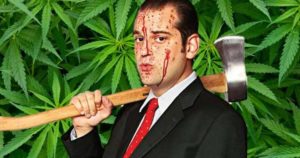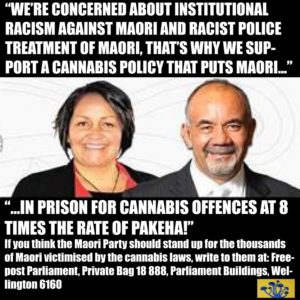
The bias against cannabis in the New Zealand media expresses itself in a number of ways. Some excerpts from a recent Southland Times article called “Invercargill Teen Jailed for One Punch Kill” show how biased this sort of reporting is.
Thanks to a phenomenon called the serial position effect, psychologists know that, when presented with a list of items, a person reading them is more likely to remember the one that was first in the list. Keep this simple fact in mind when analysing this piece.
The article told the pathetic story of Tyrone Palmer, who killed a man named Matthew Coley with a single punch to the side of the head in Invercargill earlier this year.
Near the beginning of the article is the sentence “On Friday, April 8, Palmer had… used the class A drug LSD, cannabis, and alcohol.”
Understanding the serial position effect, we know that anyone reading that passage is likely to take away from it the message that “the class A drug” LSD and cannabis were at least as responsible for the sucker punch as the alcohol was.
Anyone with a clue, of course, will know that the LSD and cannabis had nothing to do with the violence for the simple reason that psychedelics do not make people violent. Moreover, there are hundreds of cases of unprovoked violence every year in New Zealand that involve alcohol and no cannabis, and there is never a case of unprovoked violence in New Zealand that involves cannabis and not alcohol.
“The judge was particularly concerned about the effect drug and alcohol use can have on young people. ‘I am intensely troubled by the reference in the narrative to the use of [LSD], cannabis and alcohol.'”
Apart from again manipulating the reaction of the reader by leading them to associate LSD and cannabis with the violence, this sentence also uses the common prohibitionist rhetorical device of distinguishing ‘drugs’ from ‘alcohol’.
The reason why this is done is because much of the impetus behind cannabis prohibition comes from the liquor industry, as the first thing any industry does in a capitalist system is to try and destroy their competitors, and the alcohol industry knows that a large proportion of people would rather smoke cannabis than drink alcohol.
The article waits until the very last sentence to mention that Coley’s mother “planned to keep warning New Zealanders of the dangers around youth drinking.” So the quote of the one person in the whole story who places the blame on the alcohol is shunted down to the very bottom of the story.
Incredibly, the final sentence for punching another human being to death was 22 months – the same as the sentence initially handed out to Kelly van Gaalen last year for cannabis cultivation.
The ultimate effect of the kind of dishonest rhetoric shown by the author of the Southland Times article is that growing a medicinal plant comes to carry the same penalty as killing another person.



